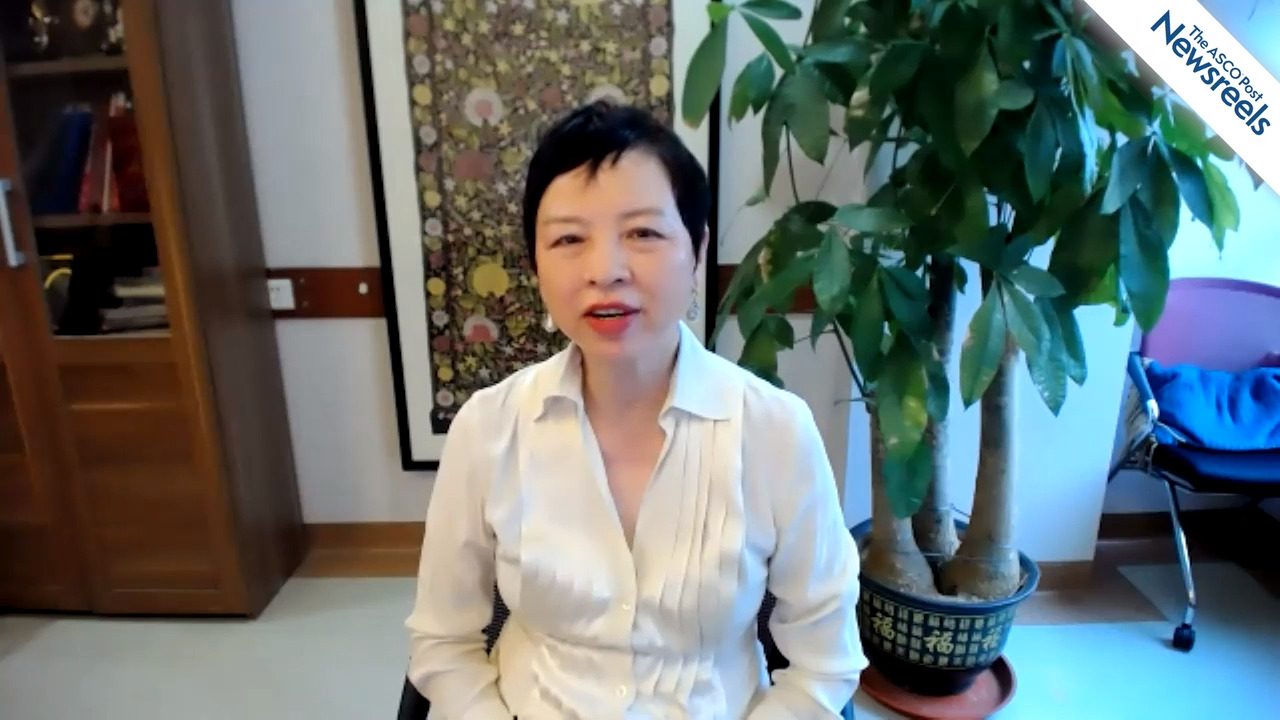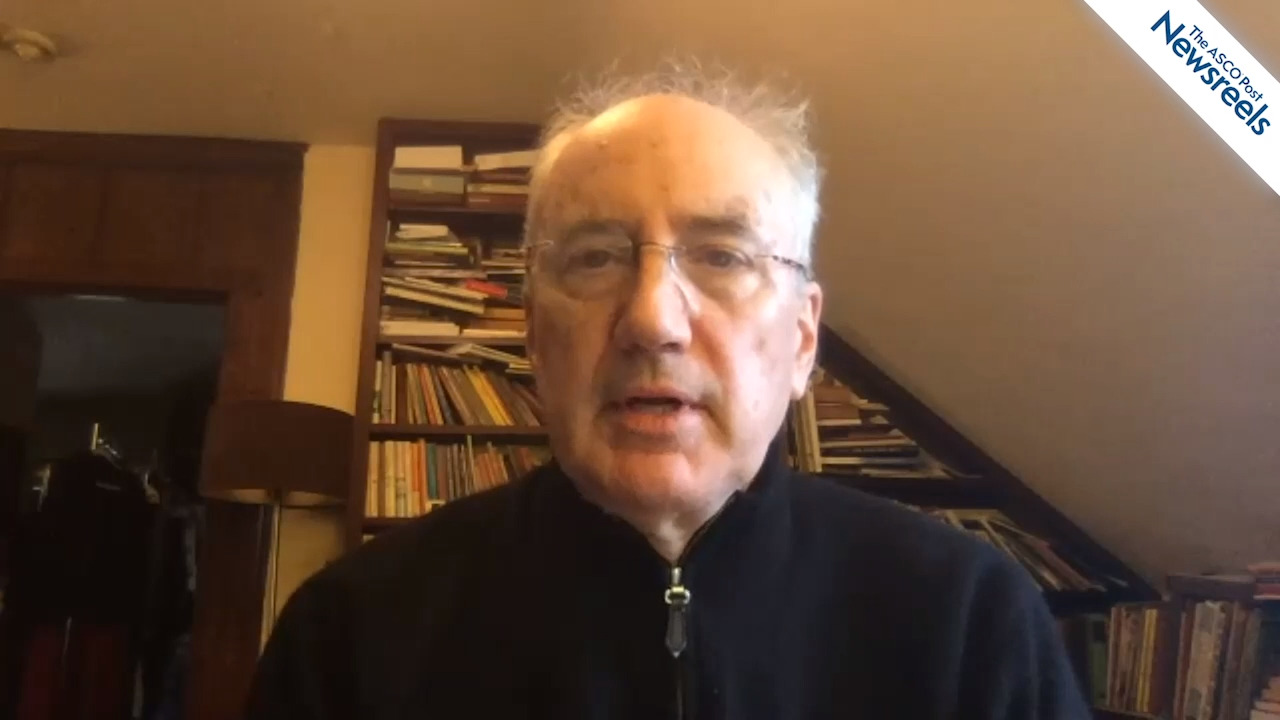Estimated Impact of the COVID-19 Pandemic on Cancer Diagnosis and Survival in Chile Over the Next Decade
In a simulation-based study reported in The Lancet Oncology, Ward et al estimated that delay in diagnosis due to the COVID-19 pandemic in Chile will lead to an early surge of newly diagnosed cancers at later stages, resulting in excess mortality over the next 10 years. As stated by the...
Study Examines How Children Cope With a Parent’s Cancer Diagnosis
A cancer diagnosis can abruptly and durably alter the course of daily life—not just for the person diagnosed but also for family members. New research presented by Sinen Korbi, MD, and colleagues at the European Society for Medical Oncology (ESMO) Congress 2021 examined the coping mechanisms of...
Christine D. Berg, MD, on Lung Cancer Deaths Attributable to Air Pollution: Global Variability
Christine D. Berg, MD, of the National Cancer Institute, discusses air pollution as a carcinogen that disproportionately affects poorer, overburdened communities and the elderly and frail—especially in countries where smoking rates are high and the use of coal predominates. Clinicians, Dr. Berg says, can help their patients by advocating for switching to clean energy and transportation and helping health-care facilities become more sustainable (Abstract PL02.07).
Cancer on the Global Stage: Incidence and Cancer-Related Mortality in South Africa
The ASCO Post is pleased to continue this occasional special focus on the worldwide cancer burden. In this issue, we feature a close look at the cancer incidence and mortality rates in South Africa. The aim of this special feature is to highlight the global cancer burden for various countries of...
Alex A. Adjei, MD, PhD, on Disparities in Lung Cancer Care: The Global Burden
Alex A. Adjei, MD, PhD, of the Mayo Clinic, talks about the fact that despite strides in lung cancer treatment, more than 60% of the world’s patients with the disease are in countries with relatively scarce medical resources, where less than 50% of patients are screened. There is a great need, says Dr. Adjei, to focus on ways to reduce disparities and remove the barriers of cost, access, quality, and lack of awareness (Abstract PL01.03).
IASLC 2021: Study Examines Global Risk of Lung Cancer Due to Air Pollution
Five European countries rank highest for lung cancer risk attributable to air pollution among those aged 50 to 69 years, according to research presented by Berg et al in the Presidential Symposium Plenary Session at the International Association for the Study of Lung Cancer (IASLC) 2021 World...
Effects of COVID-19 Infection in Children and Adolescents With Cancer: Global Analysis
In a Global Registry of COVID-19 in Childhood Cancer cohort study reported in The Lancet Oncology, Mukkada et al found that approximately one-fifth of children with cancer infected with COVID-19 worldwide had severe illness, with an associated mortality rate exceeding that reported in the general...
Global Breast Cancer Survival: Estimated Impact of Scaling Up Access to Treatment/Imaging Modalities and Quality of Care
In a study reported in The Lancet Oncology, Ward et al estimated the improvements in global overall survival for female breast cancer that could be achieved via increased availability of treatment and imaging modalities, as well as improvements in quality of care. Study Details The study used a...
Historic, Present, and Future Perspectives on Breast Cancer in Egypt
Breast cancer is the most frequently diagnosed cancer among women around the world, making it a significant public health problem.1 The disease affects both men and women, although it is rare in men, accounting for just 1% of all breast cancer diagnoses in the United States and less than 0.1% of...
Peihua (Peggy) Lu, MD, on CAR T-Cell Therapy: Research in China
Peihua Lu, MD, of Lu Daopei Hospital, discusses the state of research in China on CAR T-cell therapy, placing it in the context of the global development pipeline and the progress being made.
Cancer on the Global Stage: Incidence and Cancer-Related Mortality in Bahrain
The ASCO Post is pleased to continue this occasional special focus on the worldwide cancer burden. In this issue, we feature a close look at the cancer incidence and mortality rates in Bahrain. The aim of this special feature is to highlight the global cancer burden for various countries of the...
Cancer on the Global Stage: Incidence and Cancer-Related Mortality in Bahrain
The Kingdom of Bahrain is a high-income island nation located in the Persian Gulf. The nation is an archipelago consisting of two separate groups of islands spanning 30 miles north to south, 10 miles east to west, and about 3.5 times the size of Washington, DC. Though situated in a region rich in ...
An Egyptian Surgical Oncologist Urges Global Cooperation to Achieve Equitable Cancer Care
In this installment of The ASCO Post’s Global Oncology series, Guest Editor Chandrakanth Are, MBBS, MBA, FRCS, FACS, spoke with Ashraf Zaghloul, MD, DrPH, Professor at the National Cancer Institute of Egypt and President of the Egyptian Society of Surgical Oncology. Dr. Zaghloul was born in 1956 in ...
How Climate Change Is Impacting Cancer Care and What Can Be Done to Reduce Oncology’s Footprint on the Environment
Worldwide, the global average surface temperature has risen at a similar rate of 0.17°F per decade since 1901, with the warmest year on record occurring in 2016 and the second warmest occurring in 2020. However, according to NOAA, since the late 1970s, the United States has warmed faster than the...
Study Explores Cost-Effectiveness of CHOP Therapy for Patients With DLBCL in Sub-Saharan Africa
In a clinical trial conducted in Malawi, researchers found that combination chemotherapy with CHOP (cyclophosphamide, doxorubicin, vincristine, and prednisone) provided curative benefit compared to current standard-of-care therapy in people diagnosed with diffuse large B-cell lymphoma (DLBCL)—and...
Global Estimates of New Cancers Attributable to Alcohol Use in 2020
In a population-based study reported in The Lancet Oncology, Rumgay et al provided estimates of the global incidence of new cancers attributable to alcohol consumption, including the estimate that 4.1% of all new cases in 2020 were related to alcohol use. Study Details In the study, population...
Canadian Oncologists Report Costly Delays in Their Drug Regulatory Process
Canada’s publicly funded health-care system has a complex drug approval and funding process. Due to multiple assessment steps and bureaucratic processes, newly developed cancer drugs can often experience long delays before oncologists may use them to treat their patients with cancer. Several...
Reflections on Evolution of Breast Cancer Care in India Over the Past 4 Decades
India has witnessed a major paradigm shift in the field of breast cancer and its management over the past 4 decades. The discipline of medical oncology has evolved exponentially over this period—a growth that few other scientific disciplines have experienced. Interventions at the individual,...
Early Adopter of Breast Conservation, Surgical Oncologist Augusto Leon, MD, Reflects on Cancer Care in Chile
In this installment of the occasional department on Global Health-Care Equity, Guest Editor, Chandrakanth Are, MBBS, MBA, FRCS, FACS, spoke with Augusto Leon, MD, a surgical oncologist and Head of the Program of Cancer at Pontifical University of Chile, Santiago. Dr. Are is JL & CJ Varner...
Predicting Global Cancer Trends in 2021
Although we are just halfway through 2021, the outlook for improvements in global cancer trends looks grim. According to new estimates by the International Agency for Research on Cancer’s Global Cancer Observatory, the global cancer burden rose to 19.3 million cases and 10 million deaths in 2020...
Postoperative Mortality and Complications After Cancer Surgery in High- vs Low- or Middle-Income Countries
In a prospective cohort study reported in The Lancet, the GlobalSurg Collaborative found that 30-day mortality after surgery for colorectal and gastric cancers, but not breast cancer, was higher in low- or middle-income countries vs high-income countries.1 Among all patients, mortality rates...
New Recommendations From WHO and HRP for the Screening and Treatment of Cervical Cancer
The World Health Organization (WHO) and the Human Reproduction Programme (HRP)—the main instrument within the United Nations system for research in human reproduction—have launched a new guideline to help countries make faster progress, more equitably, in the screening and treatment of cervical...
Cancer in Morocco: Access to Innovative Treatments and Research Status
Morocco is an Arab country in North Africa. It covers 716,550 square kilometers and has a population of nearly 36 million. The median age is 29.3 years. Morocco’s estimated gross domestic product (GDP) in 2019 was $122 million. As of 2019, Morocco’s health budget was equivalent to 4.5% of the total ...
Harnessing a Worldwide Effort to Combat COVID-19 and Cancer
This past October, in a virtually held ceremony of the General Assembly of the Union for International Cancer Control (UICC), Anil K. D’Cruz, MBBS, MS, DNB, FRCS (Hon), Director of Oncology at Apollo Hospitals in Mumbai, Chennai, and Delhi, India, began his 2-year tenure as President of the global...
Prevalence of Germline BRCA Mutations in Women With Ovarian Cancer in India
In a prospective cross-sectional study reported in JCO Global Oncology, Gupta et al found that women with ovarian cancer in India had a high prevalence of pathogenic or likely pathogenic BRCA variants. As stated by the investigators: “There are deficient data on prevalence of germline mutations in...
Colorectal Cancer Incidence and Mortality in European Countries
In a European population-based study reported in The Lancet Oncology, Cardoso et al found that colorectal cancer incidence and mortality declined more in European countries with long-standing colonoscopy or fecal test screening programs since the year 2000 compared to countries with more recently...
Effect of the COVID-19 Pandemic on Delivery of Oncology Services in India
In a study reported in The Lancet Oncology, Ranganathan et al quantified the enormous impact of the COVID-19 pandemic on delivery of cancer services in India. Study Details The study involved data from 41 cancer centers across the nation. The delivery of oncology services between March 1 and May...
Global Responses to COVID-19 Pandemic–Related Disruptions in Cancer Care
COVID-19 pandemic–related disruptions in cancer diagnosis, treatment, and research have varied worldwide and so have the responses to those disruptions. During the Society of Surgical Oncology (SSO) 2021 International Conference on Surgical Cancer Care, members of the Global Forum of Cancer...
Celebrating 50 Years of Cancer Progress: The International View
Although the National Cancer Act of 1971 has resulted in tremendous advances in cancer research, which have led to sharp declines in cancer mortality in the United States—from 1991 to 2018, there has been a 31% decrease in overall cancer death rates—and more than 17 million cancer survivors,1 much...
ASCO’s President-Elect Focuses on Advancing Equitable Cancer Care Through Innovation
Internationally renowned for his pioneering research in combining high-dose radiation therapy and chemotherapy in the treatment of locally advanced head and neck cancer to improve patient survival, ASCO’s President-Elect Everett E. Vokes, MD, FASCO, is dedicating his tenure as President to...
Oncologists Launch Global Society to Improve Clinical Research, Standardize Treatment, and Improve Patient Education About Rare Genitourinary Tumors
Late this past year, a group of oncologists led by Philippe E. Spiess, MD, MS, FRCS(C), FACS, Assistant Chief of Surgical Services and Senior Member in the Department of Genitourinary Oncology at Moffitt Cancer Center and Professor in the Department of Urology at the University of South Florida;...
Chernobyl at 35 Years: An Oncologist’s Perspective
Editor’s note: Dr. Gale is an authority on medical response to nuclear and radiation accidents and participated in rescue efforts at the Chernobyl disaster, as well as at Goiania, Tokaimura, and Fukushima, among other radiation and nuclear accidents. Anyone reading the popular press or even...
Incidence and Cancer-Related Mortality in Belize
Located on the northeast coast of Central America, Belize is a small, upper middle–income country bordered by Mexico, Guatemala, and the Caribbean Sea. Belize has a population of about 405,000 people (Table 1), of which about 15% are immigrants. Belize is considered to be one of the most...
Cancer Care in Sudan During the COVID-19 Pandemic
Sudan is one of Africa’s largest countries, rich in underutilized natural resources but rife with conflicts and civil wars that have been ongoing since it gained its independence in 1956. These problems have reflected negatively on the health-care system. Khartoum, the capital of Sudan, is a busy...
Increasing Cervical Cancer Prevention and Care in Nepal
A new JCO Global Oncology special article details the process and results of a Multidisciplinary Cervical Cancer Prevention Course that ASCO volunteers led in Nepal, where cervical cancer remains the most common cancer among women and most patients present with an advanced stage of the disease.1...
Cancer Control in Egypt: Investing in Health
Egypt is a country of 1,010,408 km2 located on the northeast corner of Africa with a population exceeding 100 million. In 2018, there were about 134,632 new cancer cases and 89,042 cancer-related deaths in Egypt. Liver and breast cancers are the most common tumors in terms of incidence and...
Female Breast Cancer Surpasses Lung Cancer as the Most Commonly Diagnosed Cancer Worldwide
Cancer ranks as a leading cause of death in every country in the world, and, for the first time, female breast cancer is the most commonly diagnosed cancer, overtaking lung cancer, according to a collaborative report from the American Cancer Society (ACS) and the International Agency for Research...
Lydia Pace, MD, MPH: A Primary Care Physician on the Front Lines of Oncology, Both Nationally and Globally
Lydia Pace, MD, MPH, was inspired to a become a doctor by her grandfather, a general surgeon in New York City, who spoke effulgently of his career in medicine, and by her mother, a social worker who was equally passionate about her profession. A primary care physician, Dr. Pace developed an...
Study Establishes Global Burden of Gallbladder and Biliary Tract Cancer
Although cancers of the gallbladder or bile ducts are rare, their rates of occurrence are increasing. A recent study published by Ouyang et al in the journal Cancer provided details on the burden of gallbladder and biliary tract cancer across 195 countries and territories from 1990 to 2017....
Edward L. Trimble, MD, MPH, on Cervical Cancer: A Global WHO Initiative
Edward L. Trimble, MD, MPH, of the National Cancer Institute, discusses the World Health Organization’s global strategy to speed the elimination of cervical cancer through vaccination, screening, treatment, and training for multidisciplinary teams in gynecologic oncology care. This marks the first time that 194 countries have committed to such an effort (ID # 10203).
Value of Global Scale-up of Cancer Care: Investment in Treatment, Imaging, and Quality of Care
In a simulation-based analysis reported in The Lancet Oncology, Ward et al found that the scaling up of cancer treatment packages, imaging modalities, and quality of care to the levels found in high-income countries would markedly reduce cancer mortality in low- to middle-income countries, as well...
New Global Breast Cancer Initiative Highlights Renewed Commitment to Improve Survival
A major new collaborative effort, the Global Breast Cancer Initiative, was introduced by the World Health Organization (WHO), with the objective of reducing global breast cancer mortality by 2.5% per year until 2040, thereby averting an estimated 2.5 million deaths. In recognition of International ...
New WHO/IAEA Publication Provides Guidance on Radiotherapy Equipment Procurement
New guidance from the World Health Organization (WHO) and the International Atomic Energy Agency (IAEA) on the procurement of radiotherapy equipment could improve access to this life-saving cancer treatment option across the world. The new technical guidance aims to ensure that the selection of...
Increase in Diagnosis of Node-Positive and Stage III Breast Cancer After Screening Interruption Due to the COVID-19 Pandemic
A new report from Italy published by Toss et al in ESMO Open noted an increase in diagnoses of node-positive and stage III breast cancer after a 2-month interruption in breast cancer screening due to the COVID-19 pandemic. These findings support recommendations for a quick restoration of breast...
Effect of Clinical Breast Examination Screening on Stage at Diagnosis and Breast Cancer Mortality
In an Indian study reported in the British Medical Journal, Mittra et al found that breast cancer screening with clinical breast examination vs active surveillance resulted in younger age and significant downstaging of disease at diagnosis of breast cancer, a significant reduction in breast cancer...
Cancer on the Global Stage: Incidence and Cancer-Related Mortality in Kenya
The ASCO Post is pleased to continue this occasional special focus on the worldwide cancer burden. In this issue, we feature a close look at the cancer incidence and mortality rates in Kenya. The aim of this special feature is to highlight the global cancer burden for various countries of the...
Impact of COVID-19 on Cancer Care Has Been ‘Profound,’ According to WHO
More than a year since the new coronavirus crisis began, its impact on cancer care has been stark, with “50% of governments (having) cancer services partially or completely disrupted because of the pandemic,” said André Ilbawi, MD, of the World Health Organization’s (WHO) Department of...
Development and Performance of a Population-Based Benchmark Model for Use of Cancer Surgery in High-Income Countries
In a study reported in The Lancet Oncology, Perera et al developed a population-based benchmark model for guideline-recommended use of surgery for primary cancers in high-income countries. Actual use of surgery was often consistent with model predictions but sometimes varied markedly. Study ...
Variation in Postoperative Mortality and Complications After Cancer Surgery Between High- vs Low- and Middle-Income Countries
In a prospective cohort study reported in The Lancet, Knight et al found that 30-day mortality after surgery for colorectal and gastric cancers was higher in low- and middle-income countries vs high-income countries (LMICs), with the difference only partly accounted for by patient or disease...
World Cancer Day 2021 to Focus on Adaptations and Innovations in Cancer Care Through COVID-19 and Beyond
To mark World Cancer Day on February 4, the Union for International Cancer Control (UICC) will give voice to and say thank you to the nurses, doctors, researchers, volunteers, advocates, and other caregivers in oncology from around the world, as well as government agencies, who have worked through...




